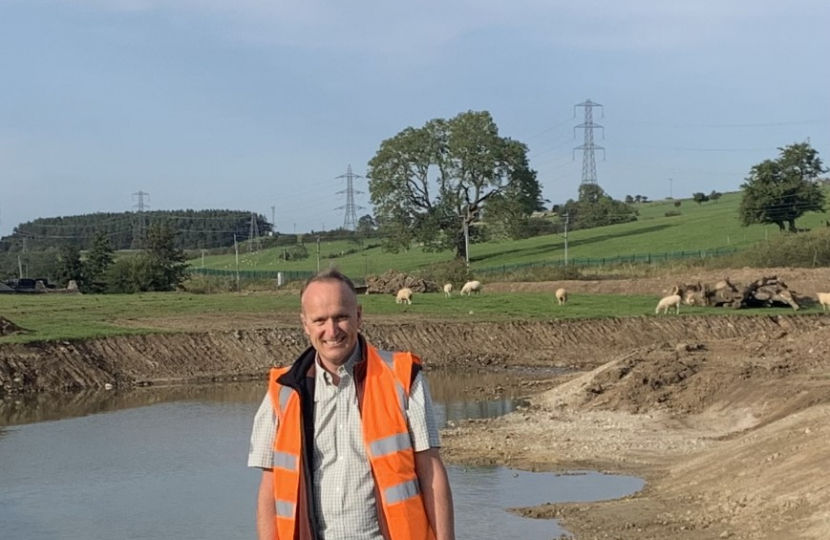
With unlimited fines for polluters, 100% storm overflow monitoring and robust intervention by the Environment Secretary on accelerating water company action, Dr Neil Hudson MP heralds 2024 as a new chapter in the story of our waterways.
As of the start of the year, companies who pollute the environment can be hit with unlimited financial penalties from the Environment Agency and Government has expanded the range of punishable offences.
Alongside this, every storm overflow – the valves responsible for releasing the vast majority of sewage into our waterways – in England’s water network is now monitored, with Government having hit its ambitious implementation targets.
Dr Neil Hudson has been a consistent voice in Parliament to stamp out water company malpractice. Watch a recent Environment, Food and Rural Affairs Select Committee hearing with water company bosses here; watch Dr Hudson support unlimited fines for polluters in the Commons here; and watch Dr Hudson decry misinformation on the issue here.
Dr Neil Hudson MP and Member of the EFRA Select Committee said:
“I have always maintained that water companies illegally discharging sewage into our precious waterways is both immoral and unacceptable. I expect better, the public expects better, and frankly our planet deserves better.
“In order to fix a problem, you must first understand it. And that is exactly what meeting our ambitious 100% storm overflow monitoring target now allows. This will help us identify polluters and take swift action. Action that now includes unlimited financial penalties for a much broader array of offences.
“Having been at the forefront of Parliament’s clean water campaign holding water company bosses and regulators to account in our vital EFRA Select Committee hearings, standing up in the Commons to call for action and helping steer robust new Government action – I am incredibly confident 2024 is the year we turn the tide on immoral sewage discharges in our lakes, rivers and seas.”
The previous £250,000 cap on Variable Monetary Penalties (VMPs) has now been scrapped and the range of offences they cover has been expanded, meaning the Environment Agency has more tools with which to hold the water industry, and others, to account.
The range of offences that can be punished with a VMP now include:
-
Breach of permit conditions from sites that discharge into rivers and seas - for example from sewage treatment works and permitted storm overflows;
-
Illegal discharges to water where there is no permit, such as in the event of agricultural pollution from slurry stores;
-
Illegal waste offences, such as from illegal scrapyards or unpermitted waste management facilities;
-
Permit breaches from manufacturing industries and power stations which contribute to air pollution.
The new unlimited penalties - a measure in the UK Government’s Plan for Water - form part of work to ensure there is more investment, stronger regulation and tougher enforcement across the water system.
The changes, which follow a consultation in Spring 2023, affect all firms that have environmental permits, including water and waste companies as well as the agricultural sector and process industries. Penalties issued will be proportionate to the size of the company and the nature of the offence, in line with Sentencing Council guidelines.
On top of this, 100% of storm overflows across the water network in England have now been fitted with Event Duration Monitors (EDMs), meeting the ambitious target set by the government to do so by the end of 2023.
Event Duration Monitors increase transparency by measuring how, when and for how long a storm overflow is in operation. This shows the public when discharges are happening, and helps the government and regulators to better hold water companies to account for illegal sewage spills and improve knowledge of overflow operation to identify where improvements can be made.
In 2010, just 7% of storm overflows had monitors fitted. Since then, the government has driven an increase in monitoring, with 100% oversight of overflows now achieved. This delivers on commitments in our Plan for Water which sets out our plans for more investment, stronger regulation and tougher enforcement in the water sector.
The installation of monitors rapidly accelerated under this government in 2013 when Lord Benyon instructed water companies to increase their storm overflow monitoring.
Storm overflows are an automatic safety valve that release excess pressure on the network from flooding and heavy rain – preventing sewage backing up into properties and stopping widespread mains pipe bursts across the country. They should, however, only be used under strict permit conditions. Increased monitoring will give government and regulators the information they need to take action when permits are breached.
The Secretary of State, Steve Barclay, is ensuring a holistic model of regulation, monitoring and enforcement is being implemented. He wrote to the Environment Agency, setting out his expectations for holding water companies to account, and that the regulator is expected to use every tool in its toolbox, including new powers provided, to stop companies breaking the law.
Alongside this, Mr Barclay wrote to all of England’s water company CEOs to clearly set out that the sewage discharge into our waterways is unacceptable. The Secretary of State has called for further action at pace in the next 12 months to tackle sewage discharge as a priority and is currently receiving and analysing water company plans.



